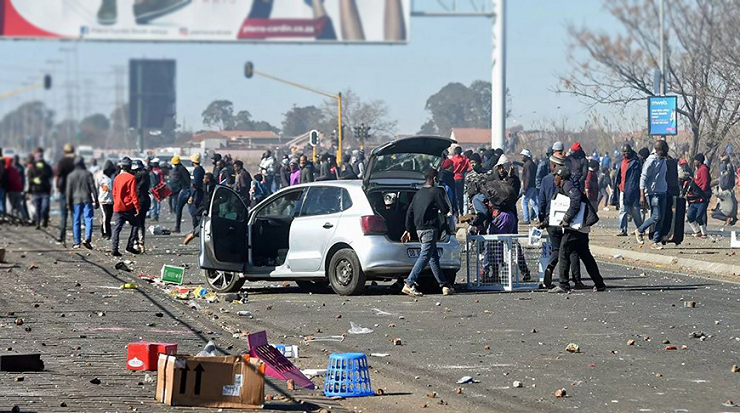On June 29, 2021, a South African court found former President Jacob Zuma, who led that nation from 2009 to 2018, guilty of contempt of court and sentenced him to 15 months in prison. Shortly after that, Jacob Zuma tried to challenge the court’s decision, but on July 9, 2021, the superior court dismissed the appeal. On the same day, protests broke out in South Africa against the arrest of the former president. Soon the country was gripped by the most significant mass riots since the abolition of apartheid in 1994. What else, besides the arrest of the ex-president, prompted South Africans to oppose the current government? What were the consequences of the riots? How will the unrest in South Africa affect the further development of the entire South African region?
As is often the case, the leading cause of people’s discontent is poverty, under which more than half of the country’s 60 million people live. It is also crucial to note that the unemployment rate in the state is relatively high – more than 30% of the total number of all able-bodied citizens. South Africa’s economy has been stagnating for the past ten years, and in 2020 it suffered its worst economic decline since World War II – 7% of GDP. Unfortunately, in 2021 the coronavirus epidemic continues to pose a significant danger. So many quarantine measures in South Africa have not been lifted, leading to a further drop in the economy.
With the onset of the coronavirus pandemic, the country had to go through a series of long and severe restrictive measures, including a ban on alcohol and tobacco products. The lockdowns brought South Africa’s poorest people to the brink of survival. Citizens were forced to stand in long lines for the most basic necessities – food. Many essential goods have become unaffordable. The new lockdown was introduced at the end of June 2021 due to the rapid spread of a new strain of coronavirus. Because of the ineffectiveness of government and municipal services, vaccination in South Africa is extremely slow. As of July 2021, only about 7% of the population have received at least one dose of the vaccine, and less than 3% have been fully vaccinated.
Despite the numerous corruption scandals that forced Jacob Zuma to resign in 2018, the former president was popular among the least well-off. Zuma had the most support from the Zulu, as he is a member of the Zulu people. The court verdict against the famous politician was the starting point of the protests. One of the key goals of the demonstrators is the release of Jacob Zuma.
The epicenters of the rioting are in the country’s most populous Gauteng province, with its capital in Johannesburg, and the KwaZulu-Natal province with the most significant number of Zulu citizens, with its capital in the city of Durban.
Many major cities are in turmoil. Demonstrators loot stores, rob ATMs and stockpiles, block roads, and set buildings on fire. Coronavirus vaccination centers are no longer functioning in some areas, and law enforcement officers are almost unresponsive to calls. There are many videos of acts of looting and vandalism on the Internet.
According to many experts and analysts, the ongoing widespread unrest, coupled with a coronavirus epidemic and fuel shortages, could lead South Africa to a real humanitarian disaster.
According to various estimates, the material damage caused can be estimated at tens of millions of dollars. South Africa’s economy, already severely battered by years of stagnation and the coronavirus pandemic, is being dealt a painful blow from which it will not quickly recover.
To stop the protests, the South African leadership deployed various resources. Volunteers work together with the police. Squads of ordinary citizens were forced to confront the looters. On July 12, the authorities decided to activate regular army units at the tensest points of the protest to end the mass unrest. As of mid-July 2021, more than 200 people had died in the crackdown.
On July 17, 2021, South African President Cyril Ramaphosa stated that his government was not prepared for mass protests. The head of state said that he would have to declare a state of emergency when other methods of normalizing the situation in the country proved ineffective. Cyril Ramaphosa believes that South Africa’s constitutional order is in a very vulnerable position.
With each passing day, the protests are gaining strength. Unfortunately, either outcome will be tragic for South Africa. The high death toll indicates the irreconcilable conflict between the demonstrators and the authorities, and the ferocity of the riots. It is worth noting that the unrest in the country could provoke a new mass exodus of white people. Citizens of European descent, who represent the most affluent social stratum, were seriously affected during the protests in South Africa. Also, a sharply negative nuance is the fact that unrest could lead to the increased separatist sentiment among the Zulu, which could ultimately jeopardize the territorial integrity of South Africa.
All of the above could create a new hotbed of instability in the South African region. If analysts’ worst fears come true, South Africa could turn from one of the continent’s most developed countries into several poor, dysfunctional mono-ethnic states.
The conclusion may be reached that the riots in South Africa undoubtedly harm the country’s development. The government must take the proper steps to stop the unrest. If the government’s decisions prove wrong, South Africa risks losing the gains that have made it the most economically prosperous country in Africa; this, in turn, will lead to a sharp drop in living standards throughout the region.
Petr Konovalov, a political observer, exclusively for the online magazine “New Eastern Outlook”.
Related posts:
Views: 0
 RSS Feed
RSS Feed

















 July 27th, 2021
July 27th, 2021  Awake Goy
Awake Goy 
 Posted in
Posted in  Tags:
Tags: 
















